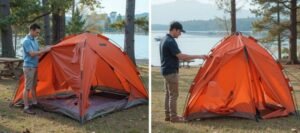Tent camping offers a wonderful opportunity to immerse yourself in nature, unwind, and form lasting memories. Yet, for those new to the experience, it’s surprisingly easy to commit missteps that can derail your entire trip. Whether you’re venturing out for the very first time or looking to perfect your outdoor skills, the following guide will help you dodge typical errors and make the most of your adventure.
Skipping Practice at Home
The Mistake
Many newcomers assume erecting a tent is straightforward—until they arrive at the campsite and struggle with tangled poles, elusive rainflies, or stubborn stakes.
What to Do Instead
- Test Drive at Home: Pitch your tent in your backyard or a nearby park before the actual trip.
- Identify Issues Early: Familiarize yourself with the setup process and sort out any missing parts or confusing instructions ahead of time.
Choosing the Wrong Campsite
The Mistake
Simply picking the first open spot can lead to comfort problems or even potential hazards. Common errors include settling in a flood-prone area, setting up too near a fire pit, or camping under dead branches that could fall.
What to Do Instead
- Opt for Elevated Ground: Aim for a level surface that’s slightly higher than its surroundings.
- Avoid Widowmakers: Steer clear of fragile, hanging branches and loose tree limbs.
- Mind Traffic: Look for some shade but ensure you’re not directly in the campground’s busiest pathways.
Not Checking the Weather
The Mistake
Heading out under the assumption that the weather will cooperate can leave you caught off guard by a sudden downpour, chilly nights, or gusty winds.
What to Do Instead
- Forecast First: Check the weather a few days in advance and again right before you depart.
- Prepare for Extremes: Pack a sturdy rain jacket, extra layers, and a reliable rainfly to handle any sudden weather changes.
Ignoring Tent Ventilation
The Mistake
Sealing the tent completely at bedtime might seem like a surefire way to stay warm, but it often creates condensation that leaves your gear and sleeping bag damp by sunrise.
What to Do Instead
- Allow Airflow: Keep vents or mesh panels partially open.
- Balance Comfort: Proper ventilation minimizes moisture buildup without sacrificing too much warmth.
Overpacking or Underpacking
The Mistake
Packing too much gear can complicate your setup and increase the load you have to haul. On the flip side, bringing too little may leave you short on crucial supplies.
What to Do Instead
- Stick to a Checklist: Include sleeping gear (bag, pad), cooking essentials (stove, utensils), season-appropriate clothing, and safety basics (first aid kit, flashlight).
- Prioritize Function: If you’re not certain you’ll use something, consider leaving it behind.
Improper Stake Placement
The Mistake
Some beginners drive tent stakes straight down or skip this step entirely, leading to a tent that can sag or collapse in windy conditions.
What to Do Instead
- Angle Your Stakes: Insert stakes at about a 45-degree angle away from the tent.
- Keep It Taut: Pull corners tight to ensure the tent maintains a solid, stable shape.
Forgetting Ground Protection
The Mistake
Pitching your tent directly on bare ground can damage the tent floor and let moisture seep in.
What to Do Instead
- Use a Footprint or Tarp: Place a groundsheet just smaller than your tent’s base.
- Prevent Pooling: Tuck in any edges so rainwater doesn’t collect underneath.
Not Bringing Sufficient Lighting
The Mistake
Relying solely on a phone flashlight or a single lantern can leave you struggling to see once it gets dark—especially if your batteries die.
What to Do Instead
- Multiple Light Sources: Bring headlamps for hands-free use, a lantern for your tent, and extra batteries or a portable power bank to keep devices charged.
- Spare Options: A backup flashlight can be a lifesaver if your primary light fails.
Underestimating Insects
The Mistake
Bugs and mosquitoes can swiftly turn a serene evening around the campfire into an annoying ordeal.
What to Do Instead
- Insect Repellent: Bring a trustworthy bug spray and apply it consistently, particularly at dusk.
- Added Defenses: Consider citronella candles or a mosquito net for extra peace of mind.
Neglecting Safety Precautions
The Mistake
Overlooking vital safety steps—like storing food properly or managing campfires—can create dangerous situations for you and local wildlife.
What to Do Instead
- Food Storage: Use sealed containers or bear-proof canisters and keep them away from your sleeping area.
- Fire Safety: Only build fires in designated areas, never leave them unattended, and thoroughly douse them before bedtime.
- Wildlife Education: Learn about common local animals and the best practices for avoiding negative encounters.
Skipping Cleanup
The Mistake
Leaving behind trash or leftover food invites animals, degrades the environment, and inconveniences future campers.
What to Do Instead
- Leave No Trace: Pack out everything you brought in, including food scraps.
- Responsible Disposal: If bins aren’t available, carry waste home with you.
- Tidy As You Go: Clean up cooking areas and spills right away to avoid attracting wildlife.
Rushing the Take-Down Process
The Mistake
After a few days off-grid, it’s tempting to rush your pack-up. But hurrying can damage gear or cause you to misplace important items.
What to Do Instead
- Shake It Out: Remove dirt and debris from your tent before folding.
- Let It Dry: Air the tent out to avoid mold, mildew, or odors.
- Organized Storage: Keep poles, stakes, and other components in their respective bags so you can find them easily next time.
Bonus Tips for a Successful Tent Camping Trip
- Stay Organized: Sort gear into labeled containers or bags to quickly locate what you need.
- Test Your Equipment: Verify that everything—from your tent to the stove—functions correctly prior to departure.
- Start Small: For your initial trips, pick a campsite near home with basic amenities (bathrooms, potable water).
More Tips for Beginner Campers
Avoiding these common errors is a major step toward a rewarding camping trip, but being prepared is just as crucial. For guidance on selecting the perfect tent, read our article on what size tent you really need for families, couples, and solo travelers. Ensuring you have adequate space can make or break your comfort level.
If you want to fine-tune your setup skills, check out our detailed advice on how to set up a tent: a step-by-step guide for first-timers. Familiarizing yourself with the basics beforehand will spare you time and frustration once you’re at the site.
Final Thoughts
Tent camping is one of the best ways to experience nature, but keeping informed and well-prepared is essential to a hassle-free outing. By practicing your setup routine, choosing your campsite wisely, and staying mindful of potential pitfalls, you’ll be set for a trip that’s both smooth and memorable. With these pointers in hand, you’re ready to embrace the great outdoors with confidence!
Reviewed and updated on 01/24/2025




